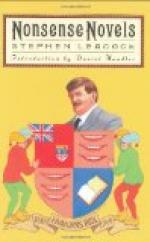“Boss,” said the boy hero, “will you trust me for the price of a square meal?”
They set the dog on him.
Such, reader, is the hardness and bitterness of the Great City.
For fourteen weeks Hezekiah Hayloft looked for work. Once or twice he obtained temporary employment only to lose it again.
For a few days he was made accountant in a trust company. He was discharged because he would not tell a lie. For about a week he held a position as cashier in a bank. They discharged the lad because he refused to forge a cheque. For three days he held a conductorship on a Broadway surface car. He was dismissed from this business for refusing to steal a nickel.
Such, reader, is the horrid degradation of business life in New York.
Meantime the days passed and still Hayloft found no work. His stock of money was exhausted. He had not had any money anyway. For food he ate grass in Central Park and drank the water from the Cruelty to Animals horse-trough.
Gradually a change came over the lad; his face grew hard and stern, the great city was setting its mark upon him.
One night Hezekiah stood upon the sidewalk. It was late, long after ten o’clock. Only a few chance pedestrians passed.
“By Heaven!” said Hezekiah, shaking his fist at the lights of the cruel city, “I have exhausted fair means, I will try foul. I will beg. No Hayloft has been a beggar yet,” he added with a bitter laugh, “but I will begin.”
A well-dressed man passed along.
Hezekiah seized him by the throat.
“What do you want?” cried the man in sudden terror. “Don’t ask me for work. I tell you I have no work to give.”
“I don’t want work,” said Hezekiah grimly. “I am a beggar.”
“Oh! is that all,” said the man, relieved. “Here, take this ten dollars and go and buy a drink with it.”
Money! money! and with it a new sense of power that rushed like an intoxicant to Hezekiah’s brain.
“Drink,” he muttered hoarsely, “yes, drink.”
The lights of a soda-water fountain struck his eye.
“Give me an egg phosphate,” he said as he dashed his money on the counter. He drank phosphate after phosphate till his brain reeled. Mad with the liquor, he staggered to and fro in the shop, weighed himself recklessly on the slot machine three or four times, tore out chewing gum and matches from the automatic nickel boxes, and finally staggered on to the street, reeling from the effects of thirteen phosphates and a sarsaparilla soda.
“Crime,” he hissed. “Crime, crime, that’s what I want.”
He noticed that the passers-by made way for him now with respect. On the corner of the street a policeman was standing.
Hezekiah picked up a cobblestone, threw it, and struck the man full on the ear.
The policeman smiled at him roguishly, and then gently wagged his finger in reproof. It was the same policeman who had struck him fourteen weeks before for asking the way.




